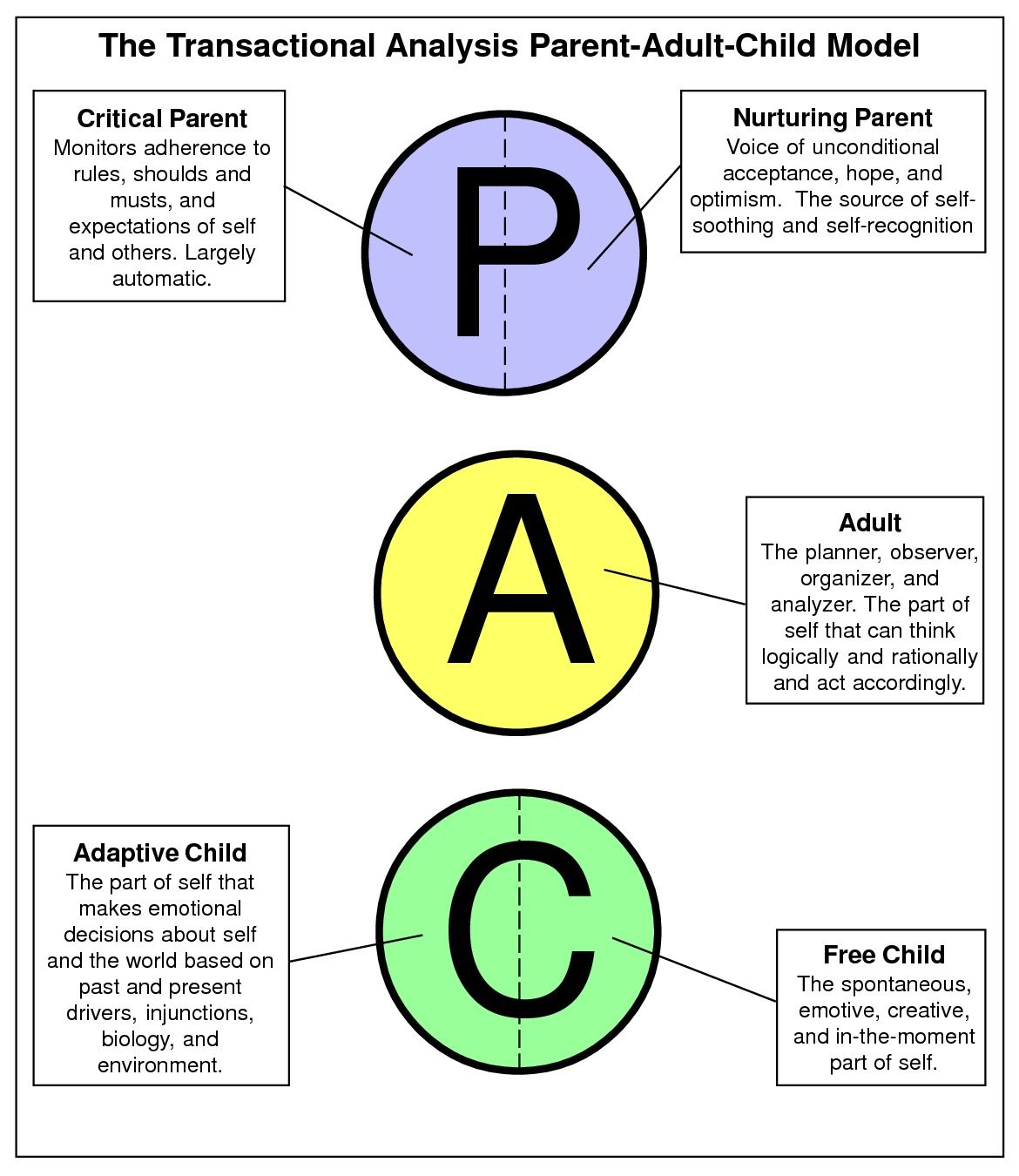Transactional Analysis
Transactional Analysis (TA) is a psychoanalytic theory and method of psychotherapy in which social transactions are analyzed to determine the ego state of the communicator (whether parent, child, or adult) as a basis for understanding behavior. In transactional analysis, the communicator is taught to change the ego state as a way of resolving emotional problems. Eric Berne developed the concept and paradigm of transactional analysis in the late 1950s.
Transactional analysis integrates theories of psychology and psychotherapy because it has elements of psychoanalytic, humanistic, and cognitive ideas.
According to the International Association for Transactional Analysis, TA is a theory of personality and a systematic psychotherapy for personal growth and personal change.”
As a theory of personality, TA describes how people are psychologically structured. To do this, it uses what is perhaps its best-known model, the ego-state model (Parent-Adult-Child). The same model helps explain how people function and express their personality in their behavior. As Berne set forth his theory, there are four life positions that a person can occupy, and occupying a certain psychological position deeply affects how an individual operationalizes his life.
How to get rid of stress
Positions are listed as follows:
I’m OK and you’re OK (I’m OK, you’re OK). This is the healthiest position in life and means I feel good about myself and feel good about others and their competence.
I’m OK, you’re not OK (I’m OK, you’re not OK). In this position, I feel good about myself, but I see others as damaged or less than they really are.
I’m not OK, you’re OK . In this position, the person sees themselves as a weak partner in relationships because others in life are definitely better than them. The person who occupies this position will unconsciously accept abuse as OK.
I’m not OK, you’re not OK . This is the worst position for a client to be in, because it means they believe that they are in a terrible state and that the rest of the world is just as bad. Consequently, there is no hope of any support or relief.

Transactional analysis is a theory of communication that can be extended to the analysis of systems and organizations. It offers a theory for child development explaining how our adult patterns of life are formed in childhood. This explanation is based on the idea of the “Life Script”: the assumption that we keep playing childhood strategies over and over again, even when it results in pain or defeat. He therefore claims to offer a theory of psychopathology. In practical application, it can be used in the diagnosis and treatment of many types of psychological disorders and provides a method of therapy for individuals, couples, families and groups. Outside of the therapeutic realm, it is used in education to help teachers maintain clear communication at an appropriate level, in counseling, in management and communication training, and the like.
All people have a basic likable core and a desire for positive growth. Everyone has the ability to think. Many aspects of an individual have a positive value to them in some way. People decide their own story and destiny, so those decisions can be changed. All emotional difficulties are treatable. Freedom from historical maladjustment embedded in a childhood script is needed to free ourselves from inappropriate, inauthentic and displaced emotions that are not an honest and honest reflection of life here and now, other mind games, compulsive behaviors and repetitive dysfunctional life patterns.
The goal of change according to TA is moving towards autonomy (freedom to make adult decisions), spontaneity, intimacy, problem solving as opposed to avoidance or passivity, learning to achieve all one’s potential and new choices.
Keywords: transactional analysis, somatic experiencing, psychotherapist Zagreb, body psychotherapy,Licensed therapist near me in Manhattan NYC, Affordable therapy services in New York State, Holistic psychotherapy sessions in NYC, Somatic Experiencing therapy for trauma recovery in New York City, NARM therapy in Brooklyn, Licensed couples therapy in Manhattan, Gestalt therapy near me in NYC, Marriage counseling in Queens NYC, Therapy for anxiety treatment in NYC, Experienced psychotherapist in New York, Licensed psychotherapist near me in NYC, Somatic Experiencing therapy sessions in New York, Trauma therapy and counseling in Manhattan, Gestalt therapy sessions in New York City, Therapy sessions for emotional regulation in New York, Trauma therapy near me in Brooklyn New York, Licensed mental health therapist in Manhattan NYC, Depression therapy in New York, New York City therapist experienced in PTSD treatment
*Photo: GettyImages
*Contact: Make an appointment
*For companies: Creative manager
How to regain self-confidence








